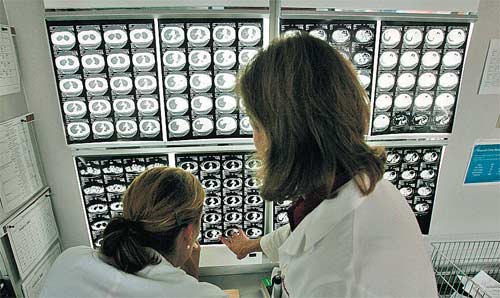Bad news from the doctor; worse news from the insurer
A diagnosis of cancer doesn't mean an automatic payout. But a new type of policy is set to change that, writes Kate Hughes

Your support helps us to tell the story
From reproductive rights to climate change to Big Tech, The Independent is on the ground when the story is developing. Whether it's investigating the financials of Elon Musk's pro-Trump PAC or producing our latest documentary, 'The A Word', which shines a light on the American women fighting for reproductive rights, we know how important it is to parse out the facts from the messaging.
At such a critical moment in US history, we need reporters on the ground. Your donation allows us to keep sending journalists to speak to both sides of the story.
The Independent is trusted by Americans across the entire political spectrum. And unlike many other quality news outlets, we choose not to lock Americans out of our reporting and analysis with paywalls. We believe quality journalism should be available to everyone, paid for by those who can afford it.
Your support makes all the difference.Being diagnosed with cancer is a serious blow. One in three of us will receive the news at some stage in our lives and it is no surprise that a recent study by the healthcare provider Bupa identified the disease as the biggest health worry of most Britons.
In such circumstances, you would expect your health insurance policy to pay up immediately, leaving you to focus on getting better. But you could be in for a nasty shock.
Advances in medical science mean many cancer patients make a complete recovery, and some cases are not even considered serious. But many health and life insurance policies will pay out only for life-threatening or terminal conditions.
"People often have no idea that they may not receive any money when they get bad news," warns Peter Chadborn, an independent financial adviser with the advisory firm CBK. "Because they've been diagnosed with something serious, they think they can tick a box and claim, but it's not that simple.
"Be careful," he adds, "that you don't focus on cost alone when it comes to [taking out insurance]. You need to be sure that the private medical or critical illness policy you have paid for will pay out when you need it to."
Critical illness cover pays you a lump sum on the diagnosis of a specific condition, while private health/ medical insurance can improve the speed and quality of treatment you receive. For example, it may give you access to appropriate licensed drugs which may not be available on the NHS.
"Around 16 per cent of claims on protection policies fail," says Matt Morris from the independent financial advice firm LifeSearch. "Of those, at least half are rejected because they don't meet the definition of a severe illness."
For example, if you are diagnosed with a slow-growing, localised cancer, such as non-aggressive skin cancer, your insurance claim may not be settled because it is not considered life threatening. In fact, more people fail to receive a payout because their condition is not severe enough than because they have failed to mention something relevant on their application form, such as a pre-existing medical condition.
"If the illness or disease is severe, the policy should pay out," adds Mr Morris, "But there are some cancers that sound bad but are treatable. That means you probably won't get any money from traditional policies."
But insurance companies are now beginning to introduce policies offering a full or partial payout depending on just how ill you are, in contrast to the usual all-or-nothing approach.
For example, Prudential's alternative critical illness policy, PruProtect, pays out depending on the severity of the illness and the hardship it could cause, if, say, you have to give up work for a period. And unlike other critical illness plans, the policy is not void once a claim has been made, although any initial payout can reduce subsequent ones significantly. The ability to claim more than once is particularly important if a claimant is diagnosed with a stage-one or stage-two cancer which then becomes more severe.
Earlier this year, the insurance industry agreed to put its house in order over its handling of the controversial issue of customer non-disclosure. In the past, claims were routinely turned down if a customer had previously failed to disclose personal details the insurer deemed important. Now, though, under a new agreement brokered by the Association of British Insurers, claims affected by non-disclosure are more likely to end in a full or partial payout rather than being refused altogether.
Join our commenting forum
Join thought-provoking conversations, follow other Independent readers and see their replies
Comments